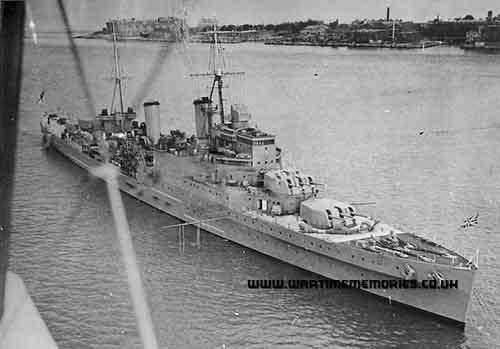My father Donald Lyon, known as "Ben" after the radio programme "Life with the Lyons" joined the RN 10/1/1939 and went to Holbrook School. After spells at St Vincent, Portsmouth, St George on the Isle of Man - a former holiday camp complete with jolly murals of laughing policemen, pixies etc, and a few days back at Pompey, he joined HMS Manchester on 30/05/1940. This turned out to not be such a holiday camp and Arctic convoys followed, including the infamous PQ17. Amongst other duties he had to collect empty shell cases as they were ejected from the HA guns, as red hot shell cases rolling about the deck did no one any favours. Hours spent in the DF station on top of "B" turret froze him solid and that was when he started to smoke, eventually able to roll cigarettes with one hand.
Flying the Walrus flying boat off the ship was always fraught with peril. However, to recover a Walrus the ship has to swing hard over to produce a smooth lagoon in any kind of sea for the aircraft to be safely recovered. One day whilst craning in the Walrus aircraft, too much time was spent connecting the crane hook to the upper mainplane. The navigator had to stand on the wing to receive the hook, the engine ticking over all the while. Sadly a wave came into the lagoon, and the poor navigator lost his footing and disappeared into the propeller and was instantly shredded. Heavy hearts on board that day.
When HMS Manchester was torpedoed the first time, Dad was sent below with others to asses damage, as being quite small he could gain access through the damaged hatches. The sight of bits of shipmates swilling in and out of the hole left by the torpedo stayed with him for a long time afterwards. The ship went to Philadelphia for repairs, and this was an enjoyable time for all concerned!
Returning to Pompey they were dry docked for more remedial work and radar upgrades when an air raid took place. Firing at the enemy aircraft began to shake the shores out from under the ship, so firing ceased lest it fell into the dock. Dad could date pictures of Manchester by the type of radar array at the masthead. On their way to Malta and Pedestal, he was taken off at Gibraltar with rheumatic fever. Subsequent events meant that it was lucky move for him, as Manchester was torpedoed off Tunisia shortly afterwards. He remembered Manchester as his favourite ship, and kept in touch with old shipmates right up until his death in 2000.
A number of ships followed Manchester, HMS Elgin - a minesweeper, and later HMS King Salvor out in Hong Kong. This vessel was being used to lift and clear wrecks from Hong Kong harbour. He was in HMS Volage which was being used to keep the Albanians and the Italians apart in 1948/49. He helmed a landing craft based in Malta, crewed by ex-jailbirds. They had signed up against a promise of reduced sentences, and somehow managed to "purloin" all kinds of materials and booze from the dockyard which they either drank or sold on to the Maltese. There were lots of Light Admiralty Grey houses on Malta for a while.
He then joined HMS Perseus, where development of the steam catapult was under way. To measure the acceleration of the catapult, he was involved in setting up an experiment involving a number of electronic time interval counters, spaced out along the flight deck. These instruments were state of the art, loaded with valves and very expensive. The switches for each one were worked by lanyards stretched across the deck. The plan was that as the catapult shoe went down the flight deck, the time intervals recorded as the switches were broken would reveal the likely acceleration of the aircraft and provide all kinds of other useful data. Imagine the surprise when the somewhat over-engineered lanyards dragged all the timing gear with it down the flight deck and slung the whole lot over the bows and into the oggin. Red faces all round, and back to the stopwatches for a while.
After a brief spell in HMS Indomitable, his RN service ended in 1952 when he was invalided out with a second bout of rheumatic fever. He finished his days helming SS Shieldhall where all his old upper deck and seamanship skills came in very useful.




